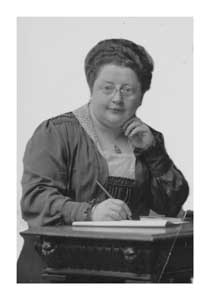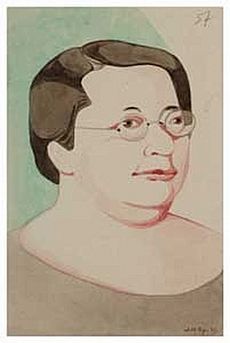Rosa Manus facts for kids
Quick facts for kids
Rosa Manus
|
|
|---|---|
| Rosette Susanna Manus | |
 |
|
| Born | 20 August 1881 |
| Died | 1942 Bernburg, Germany
|
| Known for | Sufferagist Women's rights advocate Pacifist |
Rosette Susanna "Rosa" Manus (born August 20, 1881) was a brave Dutch woman who worked for peace and women's rights. She was a Jewish pacifist, meaning she believed in solving problems without war. She was also a suffragist, someone who fought for women's right to vote.
Rosa was a key person in women's groups and anti-war movements. She led the Society for Female Suffrage and was a vice president of the Dutch Association for Women's Interests. She also helped start the Women's International League for Peace and Freedom (WILPF). Rosa strongly believed that women from all over the world could work together to bring peace. Even though she was well-known in her time, many people today do not know about her important work. She spent about 30 years fighting for women's rights and peace.
Contents
Rosa Manus's Early Life
Rosa Manus was born in 1881 in Amsterdam, Netherlands. She was the second of seven children in a wealthy Jewish family. Her father, Henry Philip Manus, was a tobacco merchant, and her mother, Soete Vita Israël, managed their home. Even though they were Jewish, the family fit in well with Dutch society.
At that time, many Jewish girls were taught at home, and Rosa was no different. Her father did not allow her to go to university or become a nurse. Because of this, helping others and fighting for what was right became her main focus. Rosa was very rich because of her family's money. This allowed her to become a leader in women's activism.
Fighting for Women's Rights and Peace
What Was Women's Suffrage?
Rosa Manus joined the international movement for women's suffrage in 1908. This was at a big meeting called the Congress of the International Woman Suffrage Alliance (IWSA) in Amsterdam. Suffrage means the right to vote in elections.
At this meeting, she met two important suffragists: Aletta Jacobs from the Netherlands and Carrie Chapman Catt from America. They became close friends and worked together for many years. Rosa was very loyal to the IWSA. She even disagreed when some people wanted to replace it with a new group called the World Women's Party.
Working for the Right to Vote in the Netherlands
After the 1908 meeting, Rosa joined the board of the Dutch Association for Women's Suffrage (Vereeniging voor Vrouwenkiesrecht, VVK). She worked closely with Mia Boissevain to spread the word about women's voting rights.
In 1913, they organized a special exhibition called "De Vrouw 1813–1913" (The Woman). This show taught people about the lives of Dutch women. Through their efforts, they successfully argued that women should have full citizenship rights in the Netherlands.
Helping to Build Peace Organizations
In 1915, Rosa Manus was very important in organizing the International Congress of Women in The Hague. At this meeting, she became the secretary of a new group called the International Committee of Women for Permanent Peace. This group later became the Women's International League for Peace and Freedom (WILPF). Rosa and Aletta Jacobs are often given credit for keeping WILPF going strong during World War I.
Rosa also traveled the world with Carrie Chapman Catt, who was the president of the IWSA at the time. From 1922 to 1923, they visited countries in Latin America like Brazil and Argentina. They met with many women activists, including Bertha Lutz, and talked about women's right to vote in those countries.
In 1935, Rosa and other members of the IAW went to Egypt. They helped Egyptian women in their efforts to gain the right to vote.
Working for Peace Movements
Rosa Manus was active in many peace movements in the 1930s. She worked as a secretary for the Peace and Disarmament Committee, a group of women from different countries. Her job was to collect signatures from people who wanted to protest war. This was done before the Geneva Disarmament Conference in 1932.
Later, in 1936, Rosa was a secretary for the Rassemblement Universel pour la Paix (RUP) and the World Peace Congress. Because of her work, the Dutch Police watched her closely. Some groups in the Netherlands, like Catholics and national socialists, started a "hate-campaign" against her. This was because she was a Jewish woman who had a lot of political and social influence.
Other Women's Groups Rosa Helped
In 1935, Rosa Manus, along with Johanna Naber and Willemijn Posthumus-van der Goot, started the International Archives for the Women's Movement (IAV). This organization is now known as the Atria Institute on Gender Equality and Women's History in Amsterdam.
Rosa's own papers are kept in these archives, but they were only found in 1992 in Moscow. When the Nazis took over the Netherlands in 1940, they took the papers from the IAV to Berlin. No one knows exactly how or when her papers ended up in Moscow, and it seems only a small part of them survived.
Rosa also started the Dutch Electrical Association for Women. In 1936, she was given a special honor by the Dutch royal family, becoming an Officer of the Order of Orange-Nassau.
Rosa's Global Connections
Rosa Manus felt like she was truly part of a worldwide women's movement. She wrote to Mary Sheepshanks about a feminist magazine called Jus Suffragii. Her strong connections were also clear in her letters to Carrie Chapman Catt, whom she often called a mother figure. Catt and Manus traveled through Europe together and became very close friends.
Rosa's Jewish Faith and Challenges
Many women's organizations in the early 1900s were mostly run by Protestant women. Sometimes, these groups had negative feelings towards Jewish or Muslim people. Rosa Manus was one of the first Jewish women to call herself a feminist.
Within these groups, Rosa sometimes felt pressure to fit in. She was even told not to give positions to other Jewish women, so the organizations would not seem "too Jewish." Rosa supported Carrie Chapman Catt's help for Jewish refugees. However, she felt she needed to keep some distance from that work because of her own Jewish background.
Rosa's Jewish faith also caused disagreements with other feminists, especially those from Muslim countries. In the 1920s and 1930s, the issue of Jewish people moving to Palestine made it hard for Muslim and Jewish women in that region to work together for women's rights.
This was true for Rosa and Egyptian feminist Huda Sha'rawi. They disagreed about Palestine, even though the IAW and WILPF blamed Britain for the problems there. Sha'rawi strongly supported the Palestinians, saying they were facing violence under British rule. Rosa and other feminists focused on the persecution of Jews during World War II. This caused more conflict between the two women. At an IWSA meeting in 1939, Rosa and Sha'rawi, who was representing Egypt, had different views about Palestine.
As Nazi Germany grew powerful in the 1930s, Rosa realized the danger to herself and her work. While watching a play in London, England, Rosa first learned about the Nazi plan to kill Jewish people. It was at this point that she gave her important papers to the IAV for safekeeping.
In 1933, after attending the Geneva Disarmament Conference, Rosa helped start a group called the Dutch Neutraal Vrouwencomite' voor de Vluchtelingen (Neutral Women's Committee for Refugees). She became its president.
Rosa was sometimes accused of being a communist or a pacifist. She was especially targeted because she was a Jewish woman.
Rosa Manus's Death
The Gestapo, the secret police of Nazi Germany, arrested Rosa Manus between August 10 and August 14, 1941. They sent her to Germany. She was arrested because she was a pacifist activist, but she was deported because she was Jewish.
First, she was taken to Auschwitz. Then, in October 1941, she was moved by train to Ravensbrück concentration camp, a camp for political prisoners and Jews. Rosa was most likely killed by gas at Bernburg in 1942. However, there is some confusion about her exact death date. Many sources suggest she was murdered at the Nazi euthanasia mental hospital in Bernburg.
Rosa Manus is not as well-known today because she did not leave behind many personal writings or a memoir, unlike other feminists of her time. She did not think she was a very important person. She often avoided taking top leadership roles because she was Jewish. However, she sometimes accepted these roles when she was the only Jewish woman who had the chance, feeling it was important to step up. She always said her actions were for feminism, not just because she was Jewish.
Images for kids
See also
 In Spanish: Rosa Manus para niños
In Spanish: Rosa Manus para niños
 | Delilah Pierce |
 | Gordon Parks |
 | Augusta Savage |
 | Charles Ethan Porter |



